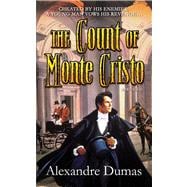
Note: Supplemental materials are not guaranteed with Rental or Used book purchases.
Purchase Benefits
What is included with this book?
| Foreword | p. ix |
| List of Characters | p. xiii |
| Marseilles-The Arrival | p. 1 |
| Father and Son | p. 9 |
| The Catalans | p. 14 |
| The Betrothal Feast | p. 21 |
| The Deputy Procureur du Roi | p. 29 |
| The Examination | p. 33 |
| The Chateau d'If | p. 41 |
| Villefort and Mercedes | p. 50 |
| The Little Cabinet of the Tuileries | p. 53 |
| The Ogre | p. 58 |
| The Hundred Days | p. 62 |
| Numbers 34 and 27 | p. 65 |
| An Italian Scholar | p. 75 |
| The Treasure | p. 91 |
| The Third Attack | p. 103 |
| The Cemetery of the Chateau d'If | p. 108 |
| The Isle of Tiboulen | p. 112 |
| The Isle of Monte Cristo | p. 122 |
| The Treasure Cave | p. 126 |
| The Stranger | p. 132 |
| The Pont du Gard Inn | p. 135 |
| Caderousse's Story | p. 140 |
| The Prison Register | p. 150 |
| Morrel and Son | p. 155 |
| The Fifth of September | p. 166 |
| Roman Bandits | p. 174 |
| The Apparition | p. 180 |
| The Carnival at Rome | p. 189 |
| The Catacombs of St Sebastian | p. 202 |
| The Guests | p. 218 |
| The Presentation | p. 234 |
| Unlimited Credit | p. 242 |
| The Pair of Dappled Greys | p. 249 |
| Haydee | p. 257 |
| The Morrel Family | p. 261 |
| Toxicology | p. 267 |
| The Rise and Fall of Stocks | p. 276 |
| Pyramus and Thisbe | p. 284 |
| M. Noirtier de Villefort | p. 291 |
| The Will | p. 297 |
| The Telegraph | p. 305 |
| The Dinner | p. 310 |
| A Conjugal Scene | p. 320 |
| Matrimonial Plans | p. 326 |
| A Summer Ball | p. 332 |
| Mme de Saint-Meran | p. 347 |
| The Promise | p. 353 |
| Minutes of the Proceedings | p. 371 |
| The Progress of Cavalcanti Junior | p. 388 |
| Haydee's Story | p. 394 |
| The Report from Janina | p. 412 |
| The Lemonade | p. 420 |
| The Accusation | p. 430 |
| The Trial | p. 434 |
| The Challenge | p. 445 |
| The Insult | p. 449 |
| The Night | p. 456 |
| The Duel | p. 463 |
| Revenge | p. 466 |
| Valentine | p. 476 |
| The Secret Door | p. 488 |
| The Apparition Again | p. 494 |
| The Serpent | p. 499 |
| Maximilian | p. 504 |
| Danglars' Signature | p. 511 |
| Consolation | p. 518 |
| Separation | p. 528 |
| The Judge | p. 542 |
| Expiation | p. 550 |
| The Departure | p. 556 |
| The Fifth of October | p. 570 |
| Afterword | p. 581 |
| Table of Contents provided by Ingram. All Rights Reserved. |
The New copy of this book will include any supplemental materials advertised. Please check the title of the book to determine if it should include any access cards, study guides, lab manuals, CDs, etc.
The Used, Rental and eBook copies of this book are not guaranteed to include any supplemental materials. Typically, only the book itself is included. This is true even if the title states it includes any access cards, study guides, lab manuals, CDs, etc.
Excerpted from The Count of Monte Cristo by Alexandre Dumas
All rights reserved by the original copyright owners. Excerpts are provided for display purposes only and may not be reproduced, reprinted or distributed without the written permission of the publisher.